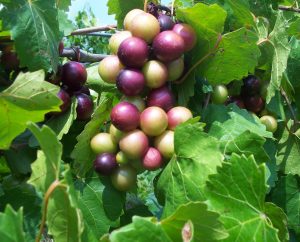
If you have ever lived in the American South, you likely have a positive connotation with American-grown grapes, particularly those that can grow wild in the dense, humid heat of the southeastern states—such as the muscadine grape. Muscadines are not only a delicious, sweet, and plump grape varietal, but they are also purported to have many health benefits, perhaps largely due to their high antioxidant content. But are there any adverse muscadine side effects that can come with consuming too much of this American fruit? In this article, we tackle this question as well as touch on some of the historical highlights of this particular species of grape.
While there are generally considered to be more pros than cons when it comes to muscadines (not least of which is that they are sweet, juicy, and delicious when eaten fresh), there are certain circumstances or conditions that may indicate that muscadines are not the best snack for you. For example, if you are diabetic or in

any way struggle with maintaining regular blood sugar levels, you may want to pick a different snack. To make matters slightly more complex, the high fiber content of the muscadine grape can generally offset the amount of sugar when it comes to your liver’s processing of said sugar—but the high fiber may cause problems like bloating or diarrhea if indulged in to excess.
Of course, if you are allergic to muscadines—or indeed, grapes of any kind—you are better off finding something else to nosh on when you are feeling peckish. Some people do experience an unwanted histamine response to this particular food—especially when it comes in the form of wine.
In short, yes! You can truly eat anything to excess. The trick with muscadines is to know your body, your own limitations, and the impact of the fruit on your body. With a high sugar, high fiber content with loads of antioxidants, a few muscadine grapes can go a long way—so enjoy them judiciously!
The Muscadine grape is a variety of grape that is native to the southeastern United States. It has been an important food source for Indigenous people for thousands of years, and evidence suggests that it was harvested and consumed by these communities as early as 7,000 years ago.
Indigenous people in the southeastern United States used Muscadine grapes in a variety of ways, including eating them fresh or dried, using them to make juice or wine, and incorporating them into traditional dishes. They also recognized the medicinal properties of the grape, using it to treat a range of ailments.
The Muscadine grape was first introduced to European explorers in the late 16th century. In 1584, the English explorer Sir Walter Raleigh encountered the grape while exploring the coast of what is now North Carolina. He observed that the
local Indigenous people were cultivating the grape and using it to make wine, and found the land “so full of grapes . . . on the sand and on the green soil, on the hills as on the plains, as well as on every little shrub as also climbing towards the tops of tall cedars, that I think in all the world the like abundance is not to be found” (via “The Muscadine Grape: Botany, Viticulture, History, and Current Industry“).
The Muscadine grape soon became popular among European colonizers, who recognized its potential as a source of food and wine. It was also cultivated for its medicinal properties, which were believed to include benefits for the heart and immune system.
Today, the Muscadine grape remains an important crop in the southeastern United States, where it is cultivated commercially and enjoyed as a local delicacy. It continues to be celebrated for its unique flavor and health benefits, and has become a symbol of the region’s rich history and culture.
Humans have been delighted by muscadines for thousands of years and still enjoy baked muscadine desserts or sweet wines—particularly in the southern U.S. By understanding the ingredients of the muscadine grape and how those ingredients interact with our bodies (from our histamine response to metabolism rate) we can discern just how much muscadine is the right amount. In the meantime, if you’re hoping for the benefits of muscadines without growing your own or trying to track down a grower, you can rely on high-value muscadine seed supplements. While these do not offer fiber, they are easily portioned and contain all the antioxidants of their fleshed-out cousins.



